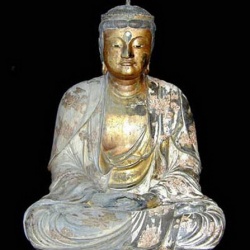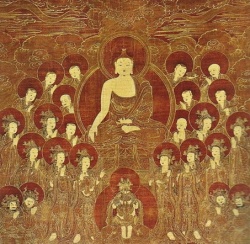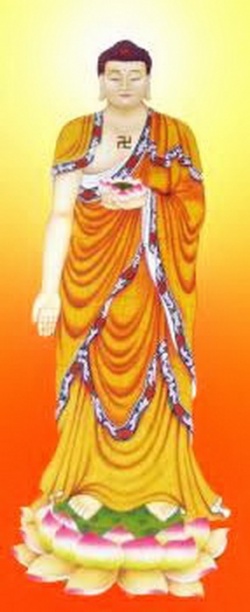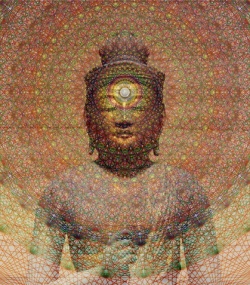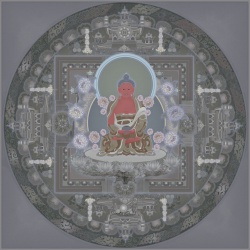Difference between revisions of "The Gospel of Buddha: Preface"
m (Text replacement - "psychical" to "psychical") |
|||
| Line 1: | Line 1: | ||
{{DisplayImages|1830|1491|986|380|1283}}{{DisplayImages|1826|1302|1472|1002|745|179}} | {{DisplayImages|1830|1491|986|380|1283}}{{DisplayImages|1826|1302|1472|1002|745|179}} | ||
| + | {{Centre|<big><big>Buddha, The Gospel</big></big><br/> | ||
| + | By<br/> | ||
| + | Paul Carus<br/> | ||
| + | Chicago, The Open Court Publishing Company,<br/> | ||
| + | [1894]<br/>}} | ||
| + | |||
This booklet needs no preface for those who are familiar with the [[sacred]] [[books]] of [[Buddhism]], which have been made accessible to the {{Wiki|Western}} [[world]] by the indefatigable [[zeal]] and industry of [[scholars]] like Beal, Bigandet, Buehler, [[Burnouf]], Childers, Alexander Csoma, {{Wiki|Rhys Davids}}, Dutoit, Eitel, Fausboell, Foucaux, Francke, Edmund Hardy, Spence Hardy, Hodgson, Charles R. Lanmann, F. Max Mueller, Karl Eugen Neumann, Oldenberg, Pischel, Schiefner, Senart, Seidenstuecker, [[Bhikkhu]] [[Nyanatiloka]], D. M. Strong, Henry Clarke Warren, Wasselijew, Weber, Windisch, Winternitz & c. | This booklet needs no preface for those who are familiar with the [[sacred]] [[books]] of [[Buddhism]], which have been made accessible to the {{Wiki|Western}} [[world]] by the indefatigable [[zeal]] and industry of [[scholars]] like Beal, Bigandet, Buehler, [[Burnouf]], Childers, Alexander Csoma, {{Wiki|Rhys Davids}}, Dutoit, Eitel, Fausboell, Foucaux, Francke, Edmund Hardy, Spence Hardy, Hodgson, Charles R. Lanmann, F. Max Mueller, Karl Eugen Neumann, Oldenberg, Pischel, Schiefner, Senart, Seidenstuecker, [[Bhikkhu]] [[Nyanatiloka]], D. M. Strong, Henry Clarke Warren, Wasselijew, Weber, Windisch, Winternitz & c. | ||
Latest revision as of 13:34, 4 April 2015
Buddha, The Gospel
By
Paul Carus
Chicago, The Open Court Publishing Company,
[1894]
This booklet needs no preface for those who are familiar with the sacred books of Buddhism, which have been made accessible to the Western world by the indefatigable zeal and industry of scholars like Beal, Bigandet, Buehler, Burnouf, Childers, Alexander Csoma, Rhys Davids, Dutoit, Eitel, Fausboell, Foucaux, Francke, Edmund Hardy, Spence Hardy, Hodgson, Charles R. Lanmann, F. Max Mueller, Karl Eugen Neumann, Oldenberg, Pischel, Schiefner, Senart, Seidenstuecker, Bhikkhu Nyanatiloka, D. M. Strong, Henry Clarke Warren, Wasselijew, Weber, Windisch, Winternitz & c.
To those not familiar with the subject it may be stated that the bulk of its contents is derived from the old Buddhist canon. Many passages, and indeed the most important ones, are literally copied in translations from the original texts. Some are rendered rather freely in order to make them intelligible to the present generation; others have been rearranged; and still others are abbreviated. Besides the three introductory and the three concluding chapters there are only a few purely original additions, which, however, are neither mere literary embellishments nor deviations from Buddhist doctrines. Wherever the compiler has admitted modernization he has done so with due consideration and always in the spirit of a legitimate development. Additions and modifications contain nothing but ideas for which prototypes can be found somewhere among the traditions of Buddhism, and have been introduced as elucidations of its main principles.
The best evidence that this book characterizes the spirit of Buddhism correctly can be found in the welcome it has received throughout the entire Buddhist world. It has even been officially introduced in Buddhist schools and temples of Japan and Ceylon. Soon after the appearance of the first edition of 1894 the Right Rev. Shaku Soyen, a prominent Buddhist abbot of Kamakura, Japan, had a Japanese translation made by Teitaro Suzuki, and soon afterwards a Chinese version was made by Mr. O'Hara of Otzu, the talented editor of a Buddhist periodical, who in the meantime has unfortunately met with a premature death. In 1895 the Open Court Publishing Company brought out a German edition by E. F. L. Gauss, and Dr. L. de Milloue, the curator of the Musee Guimet, of Paris, followed with a French translation. Dr. Federigo Rodriguez has translated the book into Spanish and Felix Orth into Dutch. The privilege of translating the book into Russian, Czechic, Italian, also into Siamese and other Oriental tongues has been granted, but of these latter the publishers have received only a version in the Urdu language, a dialect of eastern India.
Buddhism, like Christianity, is split up into innumerable sects, and these sects not infrequently cling to their sectarian tenets as being the main and most indispensable features of their religion. The present book follows none of the sectarian doctrines, but takes an ideal position upon which all true Buddhists may stand as upon common ground. Thus the arrangement into a harmonious and systematic form is the main original feature of this Gospel of Buddha. Considering the bulk of the various details of the Buddhist canon, however, it must be regarded as a mere compilation, and the aim of the compiler has been to treat his material in about the same way as he thinks that the author of the Fourth Gospel of the New Testament utilized the accounts of the life of Jesus of Nazareth. He has ventured to present the data of the Buddha's life in the light of their religio-philosophical importance; he has cut out most of their apocryphal adornments, especially those in which the Northern traditions abound, yet he did not deem it wise to shrink form preserving the marvellous that appears in the old records, whenever its moral seemed to justify its mention; he only pruned away the exuberance of wonder which delights in relating the most incredible things, apparently put on to impress while in fact they can only tire. Miracles have ceased to be a religious test; yet the belief in the miraculous powers of the Master still bears witness to the holy awe of the first disciples and reflects their religious enthusiasm.
Lest the fundamental idea of the Buddha's doctrines be misunderstood, the reader is warned to take the term "self" in the sense in which the Buddha uses it. The "self" of man translates the word atman which can be and has been understood, even the Buddhist canon, in a sense to which the Buddha would never have made any objection. The Buddha denies the existence of a "self" as it was commonly understood in his time; he does not deny man's mentality, his spiritual constitution, the importance of his personality, in a word, his soul. But he does deny the mysterious ego-entity, the atman, in the sense of a kind of soul-nomad which by some schools was supposed to reside behind or within man's bodily and psychical activity as a distinct being, a kind of thing-in-itself, and a metaphysical agent assumed to be the soul.
Buddhism is monistic. It claims that man's soul dies not consist of two things, of an atman (self) and of a manas (mind or thoughts), but that there is one reality, our thoughts, our mind or manas, and this manas constitutes the soul. Man's thoughts, if anything, are his self, and these is no atman, no additional and separate "self" besides. Accordingly, the translation of atman by "soul", which would imply that the Buddha denied the exitstence of the soul, is extremely misleading. Representative Buddhists, of different schools and of various countries, acknoledge the correctness of the view here taken, and we emphasize especially the assent of Southern Buddhists because they have preserved the tradition most faithfully and are very punctilious in the statement of doctrinal points.
"The Buddhist, the Organ of the Southern Church of Buddhism," writes in a review of The Gospel of Buddha:
- "The eminent feature of the work is its grasp of the difficult subject and the clear enunciation of the doctrine of the most puzzling problem of atman, as taught in Buddhism. So far as we have examined the question of atman ourselves from the works of the Southern canon, the view taken by Dr. Paul Carus is accurate, and we venture to think that it is not opposed to the doctrine of Northern Buddhism."
This atman-superstition, so common not only in India, but all over the world, corresponds to man's habitual egotism in practical life. Both are illusions growing out of the same root, which is the vanity of worldliness, inducing man to believe that the purpose of his life lies in his self. The Buddha puroposes to cut off entirely all thought of self, so that it will no longer bear fruit. Thus Nirvana is an ideal state, in which man's soul, after being cleansed from all selfishness, hatred and lust, has become a habitation of the truth, teaching him to distrust the allurements of pleasure and to confine all his energies to attending to the duties of life.
The Buddha's doctrine is not negativism. An investigation of the nature of man's soul shows that, while there is no atman or ego-entity, the very being of man consists in his karma, his deeds, and his karma remains untouched by death and continues to live. Thus, by denying the existence of that which appears to be our soul and for the destruction of which in death we tremble, the Buddha actually opens (as he expresses it himself) the door of immortality to mankind; and here lies the corner-stone of his ethics and also of the comfort as well as the enthusiasm which his religion imparts. Any one who does not see the positive aspect of Buddhism, will be unable to understand how it could exercise such a powerful influence upon millions and millions of people.
The present volume is not designed to contribute to the solution of historical problems. The compiler has studied his subject as well as he could under the circumstances, but he does not intend here to offer a scientific production. Nor it this book an attempt at popularizing the Buddhist religious writings, nor at presenting them in a poetic shape. If this Gospel of Buddha helps people to comprehend Buddhism better, and if in its simple style it impresses the reader with the poetic grandeur of the Buddha's personality, these effects must be counted as incidental; its main purpose lies deeper still. The present book has been written to set the reader thinking on the religious problems of to-day. It sketches the picture of a religious leader of the remote past with the view of making it bear upon the living present and become a factor in the formation of the future.
It is a remarkable fact that the two greatest religions of the world, Christianity and Buddhism, present so many striking coincidences in the philosophical basis as well as in the ethical applications of their faith, while their modes of systematizing them in dogmas are radically different; and it is difficult to understand why these agreements should have caused animostity, instead of creating sentiments of friendship and good-will. Why should not Christians say with Prof. F. Max Mueller:
- "If I do find in certain Buddhist works doctrines identically the same as in Christianity, so far from being frightened, I feel delighted, for surely truth is not the less true because it is believed by the majority of the human race."
The main trouble arises from a wrong conception of Christianity. There are many Christians who assume that Christianity alone is in possession of truth and that men could not, in the natural way of his moral evolution, have obtained that nobler conception of life which enjoins the practice of a universal good-will towards both friends and enemies. This narrow view of Christianity is refuted by the mere existence of Buddhism.
Must we add that the lamentable exclusivesness that prevails in many Christian churches, is not based upon Scriptural teachings, but upon a wrong metaphysics?
All the essential moral truths of Christianity, especially the principle of a universal love, of the eradication of hatred, are in our opinion deeply rooted in the nature of things, and do not, as is often assumed, stand in contradiction to the cosmic order of the world. Further, some doctrines of the constitution of existence have been formulated by the church in certain symbols, and since these symbols contain contradictions and come in conflict with science, the educated classes are estranged from religion. Now, Buddhism is a religion which knows of no supernatural revelation, and proclaims doctrines that require no other argument that the "come and see." The Buddha bases his religion solely upon man's knowledge of the nature of things, upon provable truth. Thus, we trust that a comparison of Christianity with Buddhism will be a great help to distinguish in both religions the essential from the accidental, the eternal from the transient, the truth from the allegory in which it has found its symbolic expression. We are anxious to press the necessity of discriminating between the symbol and its meaning, between dogma and religion, between metaphysical theories and statements of fact, between man-made formulas and eternal truth. And this is the spirit in which we offer this book to the public, cherishing the hope that its will help to develop in Christianity not less than in Buddhism the cosmic religion of truth.
The strength as well as the weakness of original Buddhism lies in its philosophical character, which enabled a thinker, but not the masses, to understand the dispensation of the moral law that pervades the world. As such, the original Buddhism has been called by Buddhists the little vessel of salvation, or Hinayana; for it is comparable to a small boat on which a man may cross the stream of worldliness, so as to reach the shore of Nirvana.
Following the spirit of a missionary propaganda, so natural to religious men who are earnest in their convictions, later Buddhists popularized the Buddha's doctrines and made them accessible to the multitudes. It is true that they admitted many mythical and even fantastic notions, but they succeeded nevertheless in bringing its moral truths home to the people who could but incompletely grasp the philosophical meaning of the Buddha's religion. They constructed, as they called it, a large vessel of salvation, the Mahayana, in which the multitudes would find room and could be safely carried over. Although the Mahayana unquestionably has its shortcomings, it must not be condemned offhand, for it serves its purpose. Without regarding it as the final stage of the religious development of the nations among which it prevails, we must concede that it resulted from an adaptation to their condition and has accomplished much to educate them. The Mahayana is a step forward in so far as it changes a philosophy into a religion, and attempts to preach doctrines that were negatively expressed, in positive propositions.
Far from rejecting the religious zeal which gave rise to the Mahayana in Buddhism, we can still less join those who denounce Christianity on account of its dogmatology and mythological ingredients. Christianity has certainly had and still has a great mission in the evolution of mankind. It has succeeded in imbuing with the religion of charity and mercy the most powerful nations of the world, to whose spiritual needs it is especially adapted. It extends the blessings of universal good-will with the least possible amount of antagonism to the natural selfishness that is no stronly developed in the Western races. Christianity is the religion of love made easy. This is its advantage. which, however, is not without its drawbacks. Christianity teaches charity without dispelling the ego-illusion; and in this sense it surpasses even the Mahayana; it is still more adapted to the needs of multitudes than a large vessel fitted to carry over those who embark on it; it is comparable to a grand bridge, a Mahasetu, on which a child who has no comprehension as yet of the nature of self can cross the stream of self-hood and worldly vanity.
A comparison of the many striking agreements between christianity and Buddhism may prove fatal to sectarian conceptions of either religion, but will in the end help to mature our insight into the true significance of both. It will bring out a nobler faith which aspires to be the cosmic religion of universal truth. Let us hope that this Gospel of Buddha will serve both Buddhists and Christians as a help to penetrate further into the spirit of their faith, so as to see its full height, length and breadth. Above any Hinayana, Mahayana, and Mahasetu is the Religion of Truth.
Paul Carus
Publisher - The Open Court Publishing Company,
LaSalle, Illinois, United States.
1894
Continue Reading
- The Gospel of Buddha: Preface
- The Gospel of Buddha:Chapter 01: Rejoice
- The Gospel of Buddha:Chapter 02: Samsara and Nirvana
- The Gospel of Buddha:Chapter 03: Truth the Saviour
- The Gospel of Buddha:Chapter 04: The Bodhisatta's Birth
- The Gospel of Buddha:Chapter 05: The Ties of Life
- The Gospel of Buddha:Chapter 06: The Three Woes
- The Gospel of Buddha:Chapter 07: The Bodhisatta's Renunciation
- The Gospel of Buddha:Chapter 08: King Bimbisara
- The Gospel of Buddha:Chapter 09: The Bodhisatta's Search
- The Gospel of Buddha:Chapter 10: Uruvela, the Place of Mortification
- The Gospel of Buddha:Chapter 11: Mara, the Evil One
- The Gospel of Buddha:Chapter 12: Enlightenment
- The Gospel of Buddha:Chapter 13: The First Converts
- The Gospel of Buddha:Chapter 14: Brahma's Request
- The Gospel of Buddha:Chapter 15: Upaka
- The Gospel of Buddha:Chapter 16: The Sermon at Benares
- The Gospel of Buddha:Chapter 17: The Sangha
- The Gospel of Buddha:Chapter 18: Yasa, the Youth of Benares
- The Gospel of Buddha:Chapter 19: Kassapa
- The Gospel of Buddha:Chapter 20: The Sermon at Rajagaha
- The Gospel of Buddha:Chapter 21: The King's Gift
- The Gospel of Buddha:Chapter 22: Sariputta and Moggallana
- The Gospel of Buddha:Chapter 23: Anathapindika
- The Gospel of Buddha:Chapter 24: The Sermon on Charity
- The Gospel of Buddha:Chapter 25: Jetavana
- The Gospel of Buddha:Chapter 26: The Three Characteristics and the Uncreate
- The Gospel of Buddha:Chapter 27: The Buddha's Father
- The Gospel of Buddha:Chapter 28: Yasodhara
- The Gospel of Buddha:Chapter 29: Rahula
- The Gospel of Buddha:Chapter 30: Jivaka, the Physician
- The Gospel of Buddha:Chapter 31: The Buddha's Parents Attain Nirvana
- The Gospel of Buddha:Chapter 32: Women Admitted to the Sangha
- The Gospel of Buddha:Chapter 33: The Bhikkhus' Conduct Toward Women
- The Gospel of Buddha:Chapter 34: Visakha
- The Gospel of Buddha:Chapter 35: The Uposatha and Patimokkha
- The Gospel of Buddha:Chapter 36: The Schism
- The Gospel of Buddha:Chapter 37: The Re-establishment of Concord
- The Gospel of Buddha:Chapter 38: The Bhikkhus Rebuked
- The Gospel of Buddha:Chapter 39: Devadatta
- The Gospel of Buddha:Chapter 40: Name and Form
- The Gospel of Buddha:Chapter 41: The Goal
- The Gospel of Buddha:Chapter 42: Miracles Forbidden
- The Gospel of Buddha:Chapter 43: The Vanity of Worldliness
- The Gospel of Buddha:Chapter 44: Secrecy and Publicity
- The Gospel of Buddha:Chapter 45: The Annihilation of Suffering
- The Gospel of Buddha:Chapter 46: Avoiding the Ten Evils
- The Gospel of Buddha:Chapter 47: The Preacher's Mission
- The Gospel of Buddha:Chapter 48: The Dhammapada
- The Gospel of Buddha:Chapter 49: The Two Brahmans
- The Gospel of Buddha:Chapter 50: Guard the Six Quarters
- The Gospel of Buddha:Chapter 51: Simha's Question Concerning Annihilation
- The Gospel of Buddha:Chapter 52: All Existence is Spiritual
- The Gospel of Buddha:Chapter 53: Identity and Non-Identity
- The Gospel of Buddha:Chapter 54: The Buddha Omnipresent
- The Gospel of Buddha:Chapter 55: One Essence, One Law, One Aim
- The Gospel of Buddha:Chapter 56: The Lesson Given to Rahula
- The Gospel of Buddha:Chapter 57: The Sermon on Abuse
- The Gospel of Buddha:Chapter 58: The Buddha Replies to the Deva
- The Gospel of Buddha:Chapter 59: Words of Instruction
- The Gospel of Buddha:Chapter 60: Amitabha
- The Gospel of Buddha:Chapter 61: The Teacher Unknown
- The Gospel of Buddha:Chapter 62: Parables
- The Gospel of Buddha:Chapter 63: The Widow's Two Mites and the Parable of the Three Merchants
- The Gospel of Buddha:Chapter 64: The Man Born Blind
- The Gospel of Buddha:Chapter 65: The Lost Son
- The Gospel of Buddha:Chapter 66: The Giddy Fish
- The Gospel of Buddha:Chapter 67: The Cruel Crane Outwitted
- The Gospel of Buddha:Chapter 68: Four Kinds of Merit
- The Gospel of Buddha:Chapter 69: The Light of the World
- The Gospel of Buddha:Chapter 70: Luxurious Living
- The Gospel of Buddha:Chapter 71: The Communication of Bliss
- The Gospel of Buddha:Chapter 72: The Listless Fool
- The Gospel of Buddha:Chapter 73: Rescue in the Desert
- The Gospel of Buddha:Chapter 74: The Sower
- The Gospel of Buddha:Chapter 75: The Outcast
- The Gospel of Buddha:Chapter 76: The Woman at the Well
- The Gospel of Buddha:Chapter 77: The Peacemaker
- The Gospel of Buddha:Chapter 78: The Hungry Dog
- The Gospel of Buddha:Chapter 79: The Despot
- The Gospel of Buddha:Chapter 80: Vasavadatta
- The Gospel of Buddha:Chapter 81: The Marriage-Feast in Jambunada
- The Gospel of Buddha:Chapter 82: A Party in Search of a Thief
- The Gospel of Buddha:Chapter 83: In the Realm of Yamaraja
- The Gospel of Buddha:Chapter 84: The Mustard Seed
- The Gospel of Buddha:Chapter 85: Following the Master Over the Stream
- The Gospel of Buddha:Chapter 86: The Sick Bhikkhu
- The Gospel of Buddha:Chapter 87: The Patient Elephant
- The Gospel of Buddha:Chapter 88: The Conditions of Welfare
- The Gospel of Buddha:Chapter 89: Sariputta's Faith
- The Gospel of Buddha:Chapter 90: Pataliputta
- The Gospel of Buddha:Chapter 91: The Mirror of Truth
- The Gospel of Buddha:Chapter 92: Ambapali
- The Gospel of Buddha:Chapter 93: The Buddha's Farewell Address
- The Gospel of Buddha:Chapter 94: The Buddha Announces His Death
- The Gospel of Buddha:Chapter 95: Chunda, the Smith
- The Gospel of Buddha:Chapter 96: Metteyya
- The Gospel of Buddha:Chapter 97: The Buddha's Final Entering into Nirvana
- The Gospel of Buddha:Chapter 98: The Three Personalities of the Buddha
- The Gospel of Buddha:Chapter 99: The Purpose of Being
- The Gospel of Buddha:Chapter 100: The Praise of All the Buddhas
